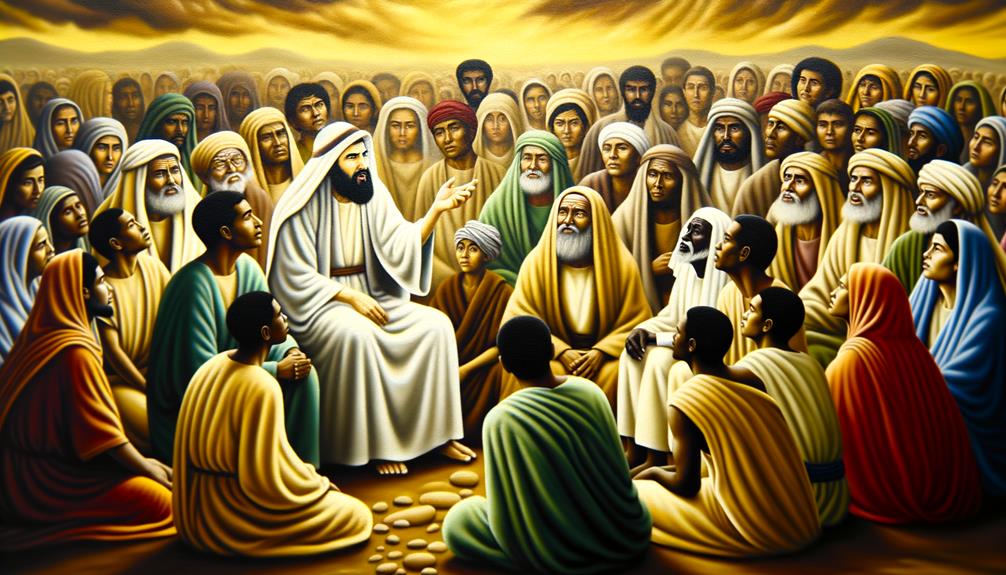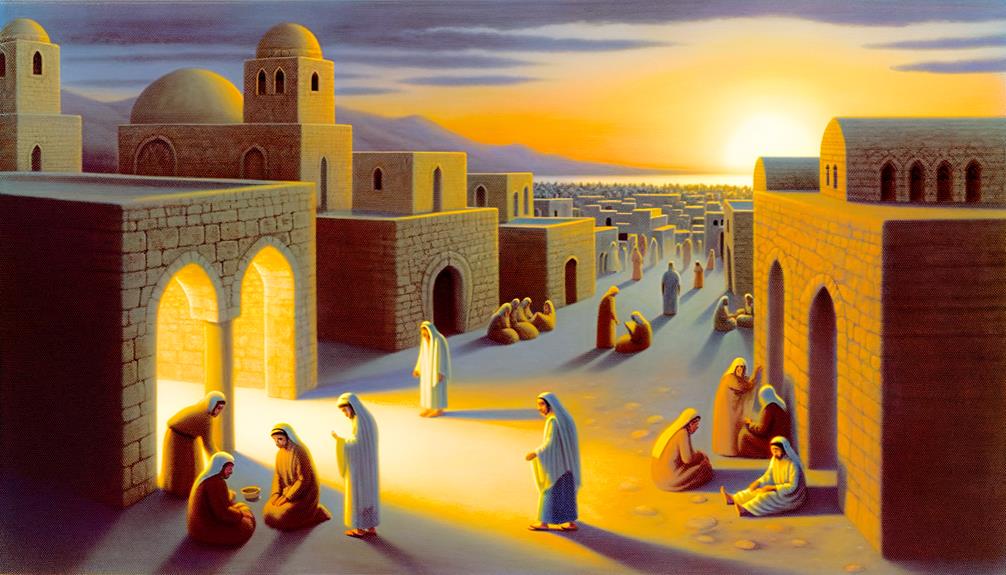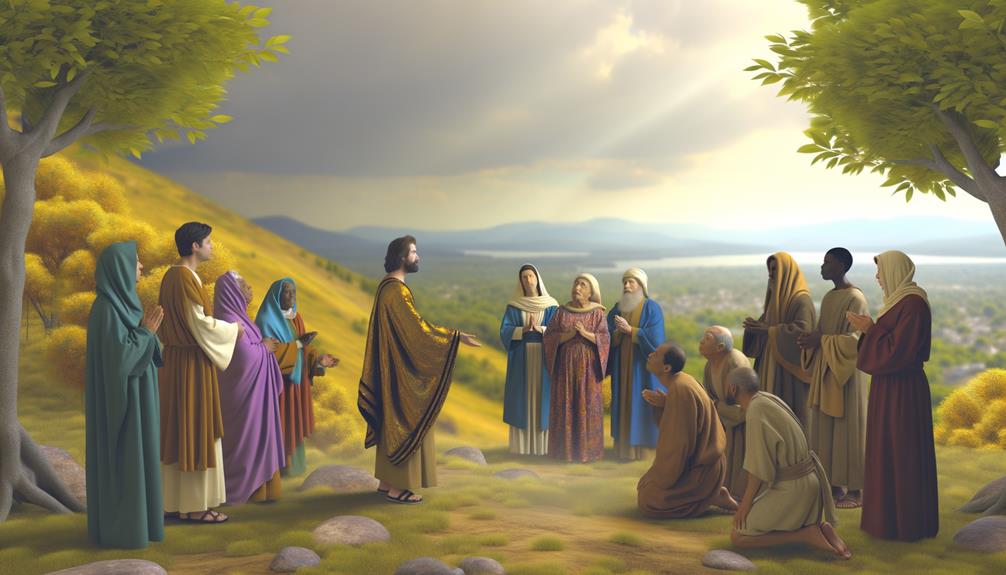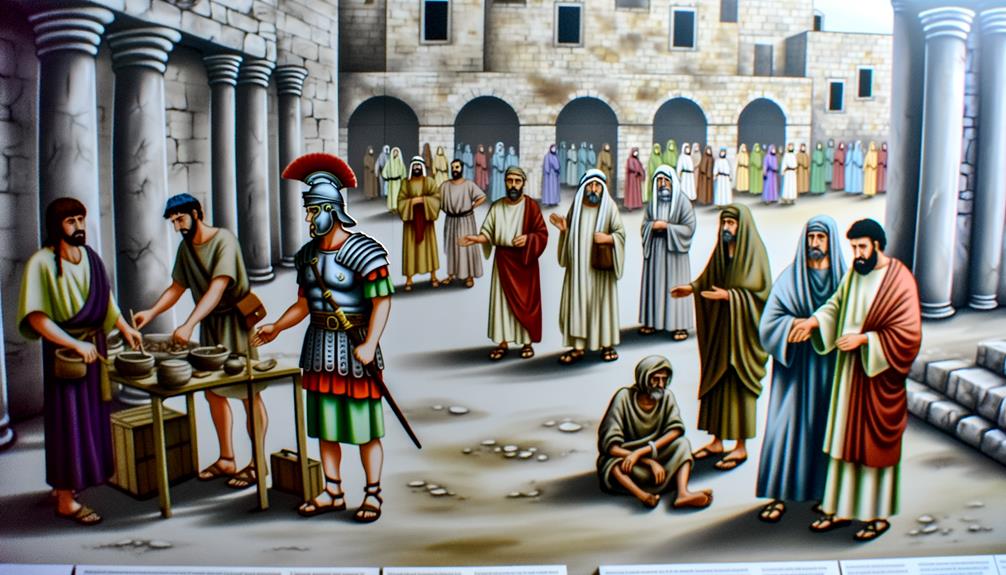First Will Be Last Bible Verse Meaning: Kingdom Values
The biblical phrase ‘the first will be last‘ underscores a theological principle that challenges societal hierarchies and underscores divine justice. Found in Matthew, Mark, and Luke, this statement highlights the values of humility and selflessness as central to God’s Kingdom.
It encourages believers to adopt a servant-leadership mindset, reversing worldly notions of power and status. Additionally, it promotes inclusivity and compassion, elevating those marginalized in society.
The phrase serves as a reminder of the radical reordering inherent in divine justice and invites deeper contemplation of its implications for personal and communal faith practices. Understanding its full depth reveals much more.

The First Will Be Last Bible Verse: Meaning and Spiritual Lessons
| Aspect | Details |
|---|---|
| Verse Text | Matthew 20:16: “So the last will be first, and the first will be last.” |
| Biblical Context | Found in Jesus’ parable of the workers in the vineyard, teaching about God’s grace and fairness. |
| Key Themes | Humility, divine justice, reversal of worldly values, and grace in the Kingdom of God. |
| Symbolism | Represents God’s sovereign choice and the equality of all believers in His kingdom. |
| Spiritual Insights | Encourages humility, gratitude, and reliance on God’s grace rather than human status or achievements. |
| Practical Application | Reminds believers to focus on serving others and valuing God’s justice above worldly recognition. |
| Modern Relevance | Challenges societal notions of success, promoting values of humility and faithfulness. |
Biblical Occurrences

Throughout the Bible, verses are embedded within a complex historical and cultural tapestry, each occurrence providing context that enhances our understanding of their deeper meanings.
The phrase ‘the first will be last‘ appears in multiple biblical passages, particularly in the Gospels of Matthew, Mark, and Luke. Each instance reveals layers of theological significance, emphasizing divine justice and the inversion of worldly hierarchies.
It reflects the Kingdom of God’s principles, where societal status and earthly achievements hold no sway. These occurrences implore believers to embrace humility and selflessness.
Consequently, exploring these biblical instances allows us to grasp the overarching message of God’s inclusive and equitable kingdom, challenging conventional human notions of greatness and importance.
Context in Matthew

In examining the context within the Gospel of Matthew, it is vital to understand the Parable of the Workers and Jesus’ teaching on humility.
These narratives not only illuminate the values of justice and grace within the Kingdom of Heaven but also underscore the essential Christian virtues of humility and selflessness.
Parable of the Workers
The Parable of the Workers, found in Matthew 20:1-16, offers profound insights into the nature of divine justice and grace within the Kingdom of Heaven.
This parable depicts a landowner who hires laborers at different times throughout the day but pays each the same wage, regardless of their hours worked.
The narrative challenges conventional human notions of fairness, emphasizing that divine grace is not earned by human effort but freely given by God’s sovereign will.
The phrase ‘the last will be first, and the first will be last’ encapsulates this radical reordering of expectations.
It urges believers to understand that God’s generosity transcends merit, inviting a deeper reflection on the unmerited favor bestowed upon all who enter His vineyard.
Jesus’ Teaching on Humility
Emphasizing the virtue of humility, Jesus’ teachings in the Gospel of Matthew underscore the necessity of selflessness and servitude in the life of a believer.
Matthew 20:16, which states, ‘So the last will be first, and the first will be last,’ encapsulates this principle. Here, Jesus challenges societal norms that prioritize status and power, urging His followers to adopt a posture of humility.
In Matthew 23:11-12, Jesus further instructs, ‘The greatest among you will be your servant. For those who exalt themselves will be humbled, and those who humble themselves will be exalted.’
This inversion of worldly values highlights the Kingdom of Heaven‘s ethos, where true greatness is measured by one’s willingness to serve others selflessly.
Context in Mark

The Gospel of Mark presents a rich tapestry of themes, including the promise of reward for the disciples, the inverted values of the Kingdom of God, and the model of servant leadership epitomized by Jesus.
Analyzing these themes within their narrative context reveals Mark’s emphasis on radical discipleship and the redefinition of greatness.
This discussion will explore how Mark’s portrayal of these concepts provides profound insights into the nature of Christian commitment and leadership.
Disciples’ Reward Promise
In the context of Mark, Jesus’ promise of rewards to His disciples underscores the profound spiritual and eschatological benefits of forsaking worldly attachments for the sake of the Gospel. This promise highlights a divinely instituted recompense that transcends material gains, reinforcing the necessity of prioritizing spiritual commitments.
Jesus elucidates the manifold blessings awaiting those who sacrifice:
- Eternal life: Assurance of salvation and everlasting communion with God.
- Hundredfold return: Multiplication of blessings both in this life and the next.
- New family: Fellowship within the spiritual community.
- Persecutions: Recognition that trials are part of the journey.
This theological framework profoundly motivates discipleship, emphasizing the ultimate value of spiritual over temporal rewards.
Kingdom’s Inverted Values
While the world often exalts power, wealth, and status, the Kingdom of God, as depicted in Mark, subverts these values by honoring humility, service, and sacrifice.
Mark 10:31 states, ‘But many who are first will be last, and the last first,’ embodying the radical inversion of societal norms.
This countercultural paradigm is further illustrated in Mark 9:35, where Jesus teaches, ‘If anyone wants to be first, he must be the very last, and the servant of all.’
The narrative emphasizes that true greatness in God’s Kingdom is not measured by earthly standards but by one’s willingness to serve others selflessly.
Consequently, Mark’s Gospel underscores a theology where the pursuit of humility and service is paramount, redefining what it means to be truly great.
Servant Leadership Model
Building upon the Kingdom’s inverted values, the Gospel of Mark further elucidates the concept of servant leadership through Jesus’ teachings and actions.
Jesus subverts conventional notions of authority by embodying humility and service. Mark 10:43-45 highlights Jesus’ declaration that greatness in God’s Kingdom is attained through servanthood.
This model is characterized by:
- Humility: Leaders prioritize others over themselves.
- Sacrifice: True leadership involves personal cost and self-denial.
- Empathy: Understanding and addressing the needs of followers.
- Service: Performing actions that benefit others without seeking personal gain.
Context in Luke

The Gospel of Luke provides a rich tapestry of historical, cultural, and theological context that is essential for understanding the deeper meanings of its biblical verses.
Luke’s narrative emphasizes Jesus’ inclusivity, compassion, and the reversal of social norms. The phrase ‘the first will be last, and the last will be first’ (Luke 13:30) reflects this theme, challenging societal hierarchies and urging humility and service.
Jesus’ teachings in Luke often target the self-righteous and elevate the marginalized, a reflection of God’s kingdom values. This context underscores the radical redefinition of greatness and leadership, aligning with the broader Lucan message that God’s grace is available to all, regardless of status or position in society.
Historical Background

To fully grasp the significance of the Gospel of Luke, one must consider the historical backdrop of first-century Judea under Roman occupation. This period was marked by political tension, social stratification, and religious fervor. The Roman Empire’s dominance shaped daily life and governance, affecting both Jewish and Gentile communities. Understanding this context is essential for interpreting Jesus’ message and its revolutionary implications.
Key historical factors include:
- Roman governance: Centralized control and taxation.
- Jewish religious practices: Temple worship and Pharisaic influence.
- Economic disparity: Widespread poverty versus elite wealth.
- Messianic expectations: Awaiting a savior to liberate Israel.
These elements collectively provide a richer understanding of the socio-political environment in which Jesus taught.
Jesus’ Teachings on Humility

Jesus’ teachings on humility emphasize the virtues of serving others selflessly and embracing lowly positions, as reflected in numerous passages throughout the New Scriptures.
His actions, such as washing the disciples’ feet, underscore the principle that true greatness lies in humble service.
Serving Others Selflessly
One of the cornerstone teachings of Jesus Christ is the call for His followers to serve others selflessly, rooted deeply in humility and compassion. This principle is evident in His various teachings and parables, highlighting the essence of true discipleship.
Serving others selflessly involves:
- Prioritizing the needs of others above personal gain.
- Demonstrating genuine love and care through actions.
- Practicing humility by recognizing the worth of every individual.
- Following Christ’s example, who washed His disciples’ feet.
Jesus’ exhortation to serve others is not merely a moral directive but a transformative practice that aligns believers with God’s will, fostering a community built on love and mutual respect.
Embracing Lowly Positions
Building on the call to serve others selflessly, the teachings of Jesus Christ further emphasize the importance of embracing lowly positions as a manifestation of true humility.
Jesus’ exhortation in Matthew 23:12, ‘Whoever exalts himself will be humbled, and whoever humbles himself will be exalted,’ underscores the paradoxical nature of divine honor.
By choosing to identify with the marginalized and the overlooked, believers emulate Christ’s example and align themselves with God’s kingdom values.
This principle challenges societal norms that equate status with worth, urging a reorientation towards spiritual greatness defined by humility.
Consequently, embracing lowly positions is not merely an act of self-abasement but a profound acknowledgment of one’s dependence on God and solidarity with humanity.
Servanthood and Leadership

In examining the biblical concept of servanthood and leadership, it is evident that true leadership is deeply rooted in the principles of humility and selfless service as exemplified by Christ. The model of leadership presented in the Bible calls for leaders to prioritize the well-being and growth of their followers over their own ambitions.
This biblical framework for leadership can be summarized through several key aspects:
- Humility: Leaders must recognize their own limitations and dependence on God.
- Empathy: A commitment to understanding and addressing the needs of others.
- Sacrifice: Willingness to put others’ needs before personal gain.
- Integrity: Adherence to moral and ethical principles.
These elements underscore the transformative power of servant leadership in fostering a just and compassionate community.
Paradox of the Kingdom

The concept of the Kingdom of God presents a profound paradox wherein the greatest are those who serve and the least are exalted.
This inversion of worldly hierarchies challenges conventional understandings of power and status, emphasizing humility and selflessness.
Scriptural references, such as Matthew 20:16 and Mark 9:35, underscore that true greatness in God’s Kingdom is not measured by earthly accolades but by one’s willingness to serve others.
This theological principle invites believers to re-evaluate their priorities, recognizing that divine favor rests upon those who embody Christ-like humility.
It is through this paradox that the Kingdom of God reveals its transformative power, fostering a community where mutual service and sacrificial love are paramount.
Real-Life Applications

Recognizing the paradoxical nature of the Kingdom of God, believers are called to integrate these principles of humility and service into their daily lives, thereby transforming their communities through Christ-like actions.
This can be practically implemented in various ways:
- Serving Others: Prioritizing the needs of others over personal gain.
- Leadership in Humility: Leading by example through servant leadership.
- Charitable Acts: Engaging in acts of kindness without seeking recognition.
- Conflict Resolution: Approaching disputes with a mindset of reconciliation and humility.
Misinterpretations

Misinterpreting Bible verses can lead to significant theological errors and misunderstandings about the core tenets of the Christian faith.
One common misinterpretation of the verse, ‘The first will be last, and the last will be first,’ is the notion that it promotes an egalitarian social order where all hierarchies are entirely dismantled.
While the verse does advocate humility and warns against pride, it should not be narrowly construed as a call for social or economic upheaval.
Instead, it conveys a deeper spiritual truth about God’s kingdom, where divine justice and grace often upend human expectations.
Correctly understanding this verse requires a careful study of its context within the broader narrative of Scripture, emphasizing servanthood and divine sovereignty. Moreover, the themes of servanthood and divine sovereignty are intricately woven throughout the Bible, revealing a profound connection between human humility and God’s authority. When examining the famous phrase “cast the first stone explained,” it becomes clear that the message encourages us to reflect on our own flaws before passing judgment on others. This notion serves as a powerful reminder of the importance of compassion and mercy within our relationships, aligning with the overarching principles of servanthood in our spiritual journey.
Modern Relevance

Understanding the contemporary significance of biblical verses necessitates examining how their spiritual principles apply to modern life and societal contexts.
The verse ‘the first will be last, and the last will be first’ (Matthew 20:16) remains pertinent in today’s world, prompting reflections on humility, service, and social justice.
Its relevance can be seen in various aspects:
- Leadership: Encourages servant leadership over authoritarianism.
- Wealth Distribution: Calls for equitable sharing of resources.
- Social Hierarchies: Challenges societal norms that prioritize status.
- Personal Development: Inspires individuals to value humility and selflessness.
These principles offer profound insights for maneuvering contemporary challenges, fostering a society grounded in compassion and equity.
Conclusion
The phrase ‘the first will be last, and the last will be first’ encapsulates the paradoxical values of the Kingdom of God, challenging conventional hierarchies and redefining true greatness.
This concept, deeply rooted in the teachings of Jesus across the synoptic Gospels, invites believers to embrace humility and service.
Misinterpretations abound, yet its modern relevance endures, urging a re-evaluation of societal norms.
Ultimately, it underscores a divine inversion where worldly status is rendered inconsequential.






